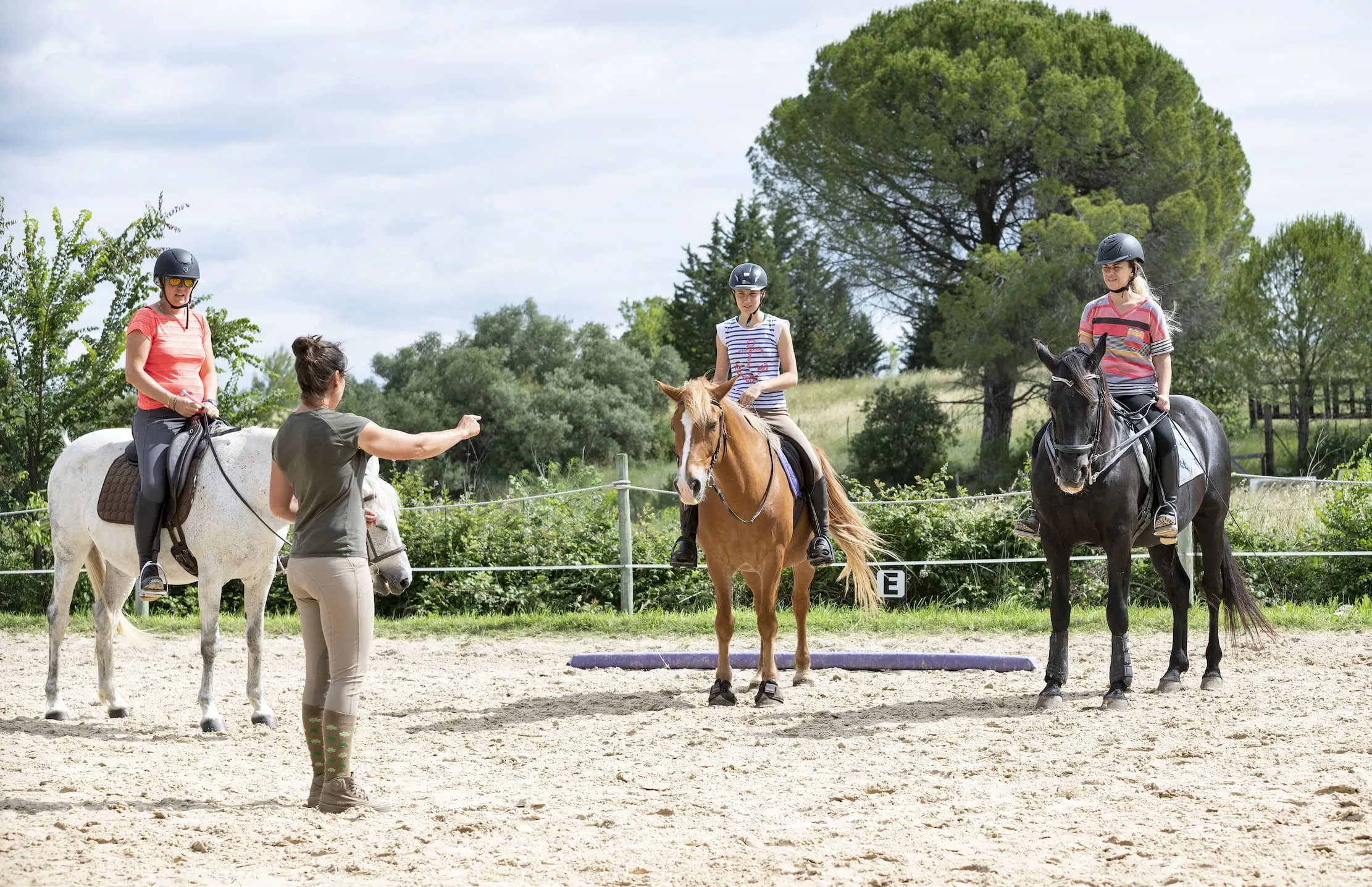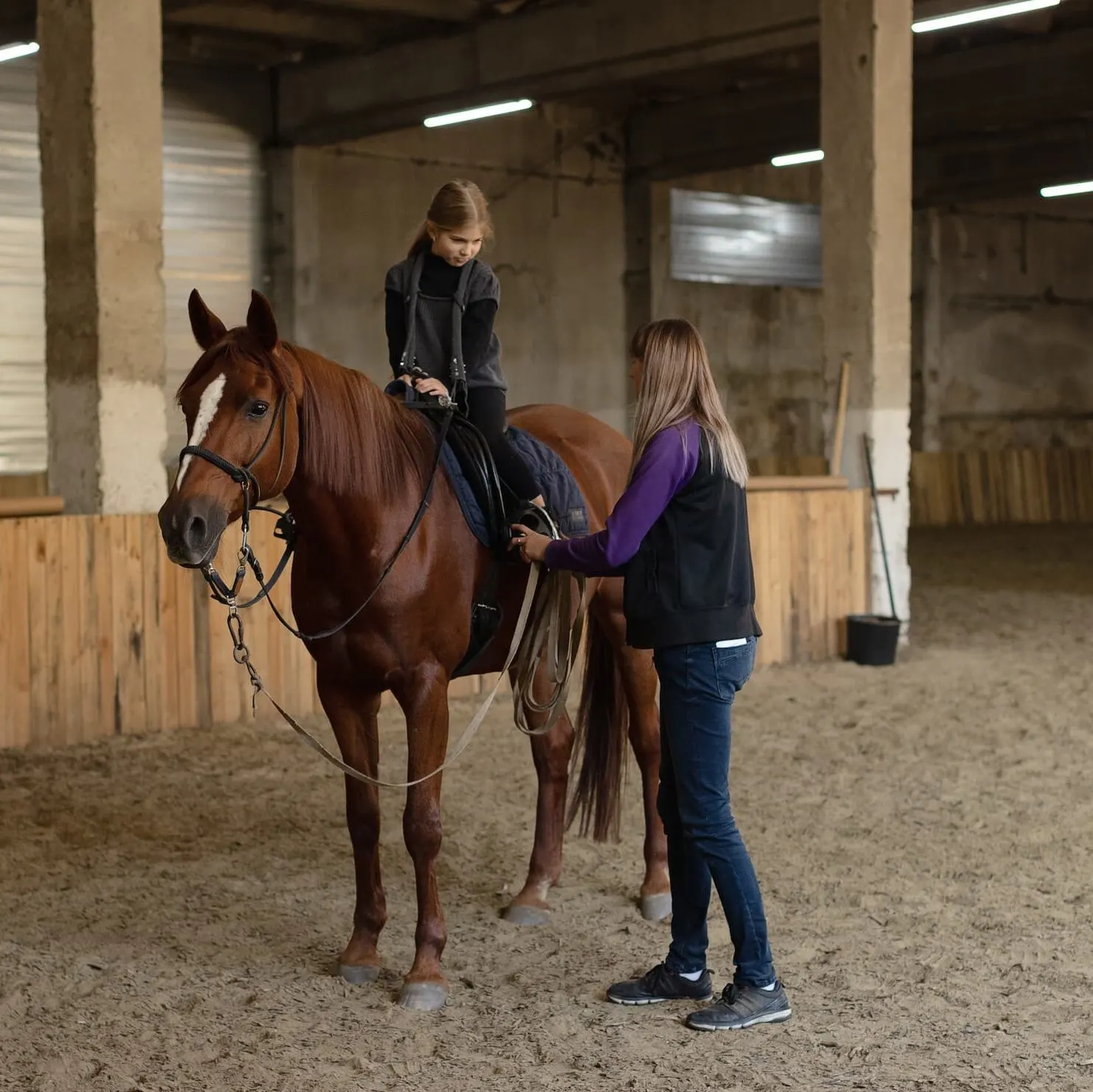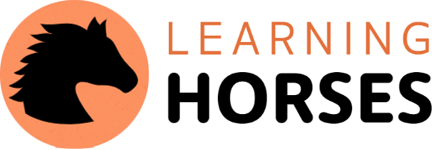The positive effect of horseback riding lessons on humans’ well-being is well documented by both countless personal stories and through academic peer-reviewed research (check out this massive research study analyzing years of research). In the last few decades, therapeutic riding has grown increasingly popular as a treatment for many disorders including mental health issues, developmental disorders, Autism spectrum disorders, and even chemical dependency and addiction.
For those of us without the challenges of a diagnosed illness or disorder, horseback riding can boost well-being, mind-body connectedness, and physical fitness.

Lessons: Getting the Benefits of Riding without Buying a Horse
Horseback riding lessons are an excellent way to get the mental and physical benefits of horseback riding without the expense and hassle of purchasing, owning, and managing your own horse. By taking horseback riding lessons, you can have the opportunity to learn how to handle horses, grow your skill as a rider, and learn in a supportive environment – all great preparation if you do one day decide to buy a horse.
Physical benefits of horseback riding lessons
Riding is an athletic pursuit that most people don’t really understand the extent of until they spent time really riding (that is, the active riding involved in horseback riding lessons rather than the passive riding of a guided trail ride). Horseback riding lessons grow strength and cardiovascular endurance.
Being an active rider stretches muscles, engages the core, and strengthens legs, abdominal muscles, and our back. Riding lessons can grow muscles that improve posture (even when we’re out of the saddle) and can increase endurance. Properly riding a trot or canter can be taxing for both horse and rider, so don’t be surprised if you find yourself out of breath after your first time riding your horse at a faster speed and a lesson!

Emotional benefits of horseback riding lessons
I like to tell the riders that I work with that their horse will challenge them emotionally because horses are fully emotionally authentic at all times. If you pay attention, you’ll learn to know exactly what your horse is feeling at any given moment – and your horse, as they pay attention to you as their rider, will know what you are feeling.
Unlike friends, family, or other people in our life who often expect us to act in a certain way and manage emotions in a way that helps them stay comfortable, horses invite us to be fully present to our emotional experience. Over time, a relationship with a horse can help us be more present to our own emotions and authentically express them.
Mental health benefits of horseback riding lessons.
I have written at length about the positive benefits that horseback riding lessons can have on girls’ self-esteem and body image. Beyond the topic of that article, horse riding lessons provide some of the essential elements that research indicates are core to mood-boosting activities: being outdoors, moving our bodies, and interacting with animals. According to peer-reviewed academic research (click on any of the previous links to review), all of these things are associated with improvement in mood or reduction in mental health symptoms.
Social benefits of horse riding lessons
Even though horseback riding lessons will be mostly about you, your riding, and your mount, horseback riding in the setting of a riding stable provides a safe social environment. I qualify with the word “safe” because it can provide a sort of structured social interaction that is easier to manage for people with social anxiety than open-ended social experiences.
For example, while life often puts us in very difficult social situations like meet and grets with new coworkers, icebreakers at a school orientation, or the total unknown of navigating a party- riding lessons gives people with social anxiety a chance to interact with people in a much less stressful way. In a riding stable, that might look like 10 minutes of brushing a horse under the instruction of a riding instructor, walking a horse around an arena with other people learning how to steer a horse for the first time, or talking with other riders after class about the lesson.
Having something to do alongside other people can help us make social connections without the pressure to make conversation. Group riding lessons are especially helpful for adding to the social benefits of horseback riding lessons.
How to Sign Up for Riding Lessons
Riding lessons are common and easily accessible to adult and young riders throughout Europe, but in the United States riding lessons aren’t as common. Because of this, finding riding lessons for you or your child can be a bit of a challenge. The best way to find horseback riding lessons is by searching for “riding stables near me” or “local horseback riding lesson.”
If you’re lucky enough to live in an area with multiple options for horseback riding lessons, be sure and try out a few riding stables before signing on with an instructor or a horseback riding class. A good riding instructor will help you feel safe and confident in the saddle, and will be sure that you are matched with a horse that isn’t too challenging for you as a beginner rider.
When is the best time to start horseback riding lessons?
There’s no age that the bad age to start horseback riding lessons. Very young children may need more support, but anyone who is active and able to mount a horse should be able to take horseback riding lessons. Learn more about the best ages to start writing via my article on how to start horseback riding lessons.
Is there a weight limit for horseback riding lessons?
Weight limits set by stables for horseback riding lessons are largely arbitrary- the weight that is “too heavy” for horseback riding depends on a large number of variables including the size of the horse, the length of the horse’s spine, the horses build, the riders body type, the rider’s balance, muscle control, etc.
If you’re concerned that you might be too heavy to take horseback riding lessons, don’t give up. Instead, call around and frankly explain your situation. If they’re unable to match you with a suitable mount, be sure and ask for a referral to someone who might be able to.
You might get met with no’s but perhaps those stables have connections with breeders, trainers, or individuals with heavy-breed horses that have conformation suitable for heavy riders. Riding lessons may be available through private farms, breeders, or trainers – not just commercial riding stables.
